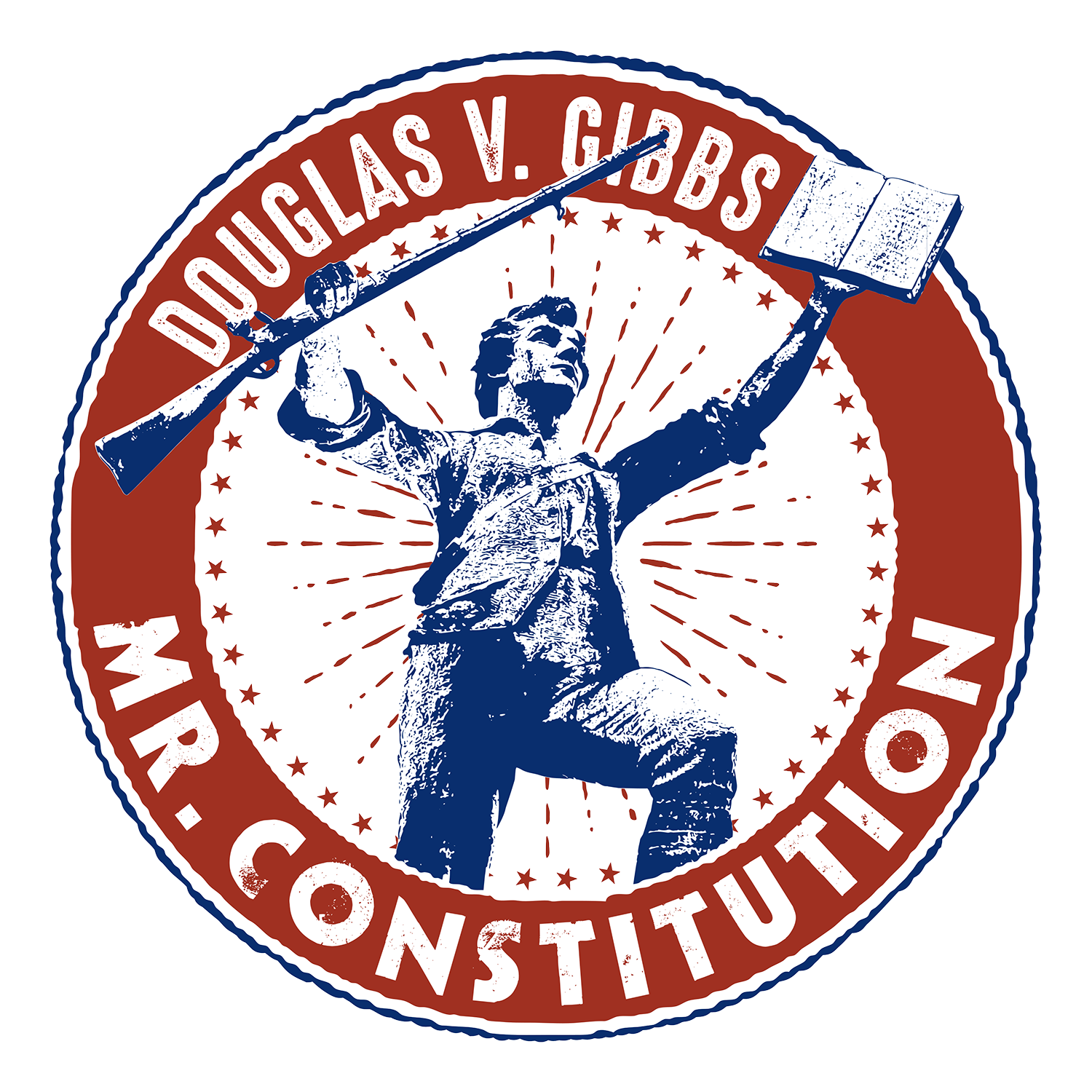By Douglas V. Gibbs
Author, Speaker, Instructor, Radio Host
A recent headline:
Trump calls birthright citizenship ridiculous, plans to sign ‘executive order’…
In my 2014 debut as a published author, 25 Myths of the United States Constitution, I address the unconstitutional belief in Birthright Citizenship. For your convenience, here is that chapter (buy the book for the other myths):
Citizens
the immigration debate. Those that
support amnesty programs argue that “since the American born children of
undocumented immigrants are American citizens, deporting their parents splits
up families.” The strategy is to
pose an argument that is laced with emotional reality that forces their
opposition to concede, and work for a compromise that may allow some illegal
aliens to remain in the country, and be eligible later for an unconstitutional
amnesty policy (Article I, Section 9, Clause 3 disallows “ex post facto
Law” to be passed, making federal amnesty programs unconstitutional).
aliens born in the United States are American citizens is not true.
children of illegal aliens born on U.S. soil are American citizens comes from
the Citizenship Clause of the 14th Amendment.
The clause reads: “All persons born or naturalized in the United
States and subject to the jurisdiction thereof, are citizens of the United
States and of the State wherein they reside.”
thereof,” is the key, here. If you
go to the debates on the congressional record of the 14th Amendment, “full
jurisdiction” means “full allegiance to America.” Since the parents are in this country in
violation of immigration law, and are subject to the jurisdiction of Mexico (or
whatever country they came from), a divided loyalty exists. Since illegal aliens are not subject to the
complete jurisdiction of the United States, their children born in the U.S. are
not automatically American citizens.
Citizenship Clause, the Congress of the United States, while debating the 14th
Amendment, intended for the clause to protect the children of the newly
emancipated slaves. Their reasoning,
however, took into consideration that the clause may be used to subvert
immigration policies.
any divided allegiances. Their
experience with the Tories, persons loyal to the British Crown, demanded that
the laws of the United States protect the American system against those that
would compromise it because of their allegiance to a foreign power.
understood the importance of full allegiance to the United States: “Any
man who says he is an American, but something else also, isn’t an American at
all. We have room for but one flag, the
American flag. We have room for but one
language here, and that is the English language … and we have room for but
one sole loyalty and that is a loyalty to the American people.” —
Theodore Roosevelt, 1919.
Civil War, after hostilities ended the emancipated slaves were not receiving
the rights and privileges of American citizens as they should have been. The former slaves were present in the United
States “legally,” and because they were here legally they were
“subject to the jurisdiction thereof,” but they were still not
receiving any assurance of equal protection under the law.
correcting the problem. Some of the language in the Civil Rights Act of 1866
states, “All persons born in the United States, and not subject to any foreign power, excluding Indians not taxed,
are hereby declared to be citizens of the United States. … All persons within the jurisdiction of the
United States shall have the same right in every State and Territory to
make and enforce contracts, to sue, be parties, give evidence, and to the full
and equal benefit of all laws and proceedings for the security of persons and
property as is enjoyed by white citizens, and shall be subject to like
punishment, pains, penalties, taxes, licenses, and exactions of every kind, and
to no other.”
of the United States” in that act, was all persons at the time of its
passage, born in the United States, including all slaves and their offspring,
but not having any allegiances to any foreign government.
authors of Section 1 of the 14th Amendment (the Citizenship Clause), noted that
its provision, “subject to the jurisdiction thereof,” excluded
American Indians who had tribal nationalities, and “persons born in the
United States who are foreigners, aliens, who belong to the families of
ambassadors or foreign ministers.”
“I now move to take up House joint resolution No. 127.”
was agreed to; and the Senate, as in Committee of the Whole, resumed the
consideration of the joint resolution (H.R. No. 127) proposing an amendment to
the Constitution of the United States.
“The first amendment is to section one, declaring that all ‘persons born in the
United States and Subject to the jurisdiction thereof, are citizens of the
United States and of the States wherein they reside. I do not propose to say anything on that
subject except that the question of citizenship has been fully discussed in
this body as not to need any further elucidation, in my opinion. This amendment which I have offered is simply
declaratory of what I regard as the law of the land already, that every person
born within the limits of the United States, and subject to their jurisdiction,
is by virtue of natural law and national law a citizen of the United
States. This will not, of course,
include persons born in the United States who are foreigners, aliens, who
belong to the families of ambassadors or foreign ministers accredited to the
Government of the United States, but will include every other class of
persons. It settles the great question
of citizenship and removes all doubt as to what persons are or are not citizens
of the United States. This has long been
a great desideratum in the jurisprudence and legislation of this country.”
born on American soil of foreign citizens are not included.
intention of freely giving away American citizenship to just anyone simply
because they may have been born on American soil.
Senator Lyman Trumbull, added that “subject to the jurisdiction of the
United States” meant “not owing allegiance to anybody else.”
provision is, that ‘all persons born in the United States, and subject to the
jurisdiction thereof, are citizens.’ That means ‘subject to the complete
jurisdiction thereof.’ What do we mean by ‘complete jurisdiction thereof?’ Not
owing allegiance to anybody else. That is what it means.”
continued, “Can you sue a Navajo Indian in court? Are they in any sense
subject to the complete jurisdiction of the United States? By no means. We make
treaties with them, and therefore they are not subject to our jurisdiction. If
they were, we wouldn’t make treaties with them… It is only those persons who
come completely within our jurisdiction, who are subject to our laws, that we
think of making citizens; and there can be no objection to the proposition that
such persons should be citizens.”
Howard concurred with what Mr. Trumbull had to say: “I concur entirely
with the honorable Senator from Illinois [Trumbull], in holding that the word
‘jurisdiction,’ as here employed, ought to be construed so as to imply a full
and complete jurisdiction on the part of the United States, whether exercised
by Congress, by the executive, or by the judicial department; that is to say,
the same jurisdiction in extent and quality as applies to every citizen of the
United States now.”
clause, then, it is understood that the intention was for those who are not
born to American citizens to have no birthright to citizenship just because
they simply were born inside the borders of this country.
mean other things, but we must remember that the Constitution cannot be changed
by the courts. Changes to the
Constitution can only be made by amendment (Article V.).
children born to American citizens, and those people who have been naturalized,
can be considered citizens of the United States, since only an American citizen
could enjoy the “extent and quality” of jurisdiction of an American
citizen now.
but that is yet another thing that our current system has created that was
enabled in complete disregard for the principles set forth in the U.S.
Constitution. Based on the original
intent of the Founding Fathers, and the 14th Amendment, there should be no
dual-citizenships.
completely their allegiance to their natural country of origin, and by allowing
this our federal government is making a mockery of our citizenship laws as
originally intended by our founders, and the framers of the 14th Amendment.
citizenship at birth to just anyone who happens to be born within American
borders. Allegiance, or complete
jurisdiction, of the child’s birth parents at the time of birth, is an integral
part of whether or not that child is an American citizen. Therefore, the idea that anchor babies are
automatically citizens because they were born into this world on American Soil
is a myth.
— Political Pistachio Conservative News and Commentary




